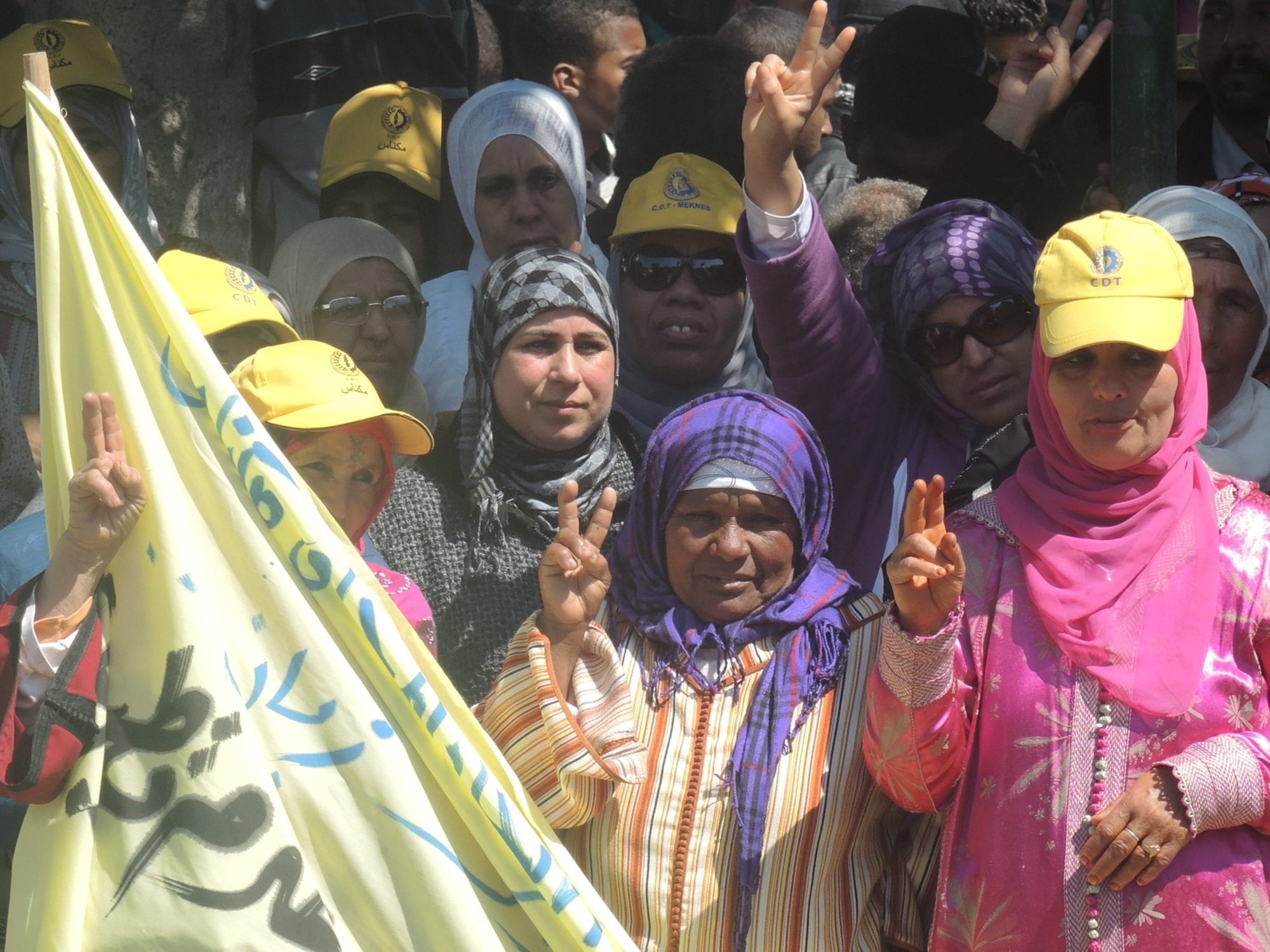
Oct 28, 2017
Agricultural work remains one of the most dangerous in the world. And women, who comprise between 50 percent and 70 percent of the informal workforce in commercial agriculture, are especially vulnerable to sexual harassment, physical abuse and other forms of gender-based violence at work.

Through gender equality training, Touriya Lahrech has enabled women farm workers to stand up for their rights. Credit: Solidarity Center/Hind Cherrouk
In Morocco, where the Solidarity Center partners with the Democratic Labor Confederation (CDT) to improve worker rights, the first step in addressing gender-based violence in the agricultural sector is enabling women to recognize its detrimental impact, says Touriya Lahrech, coordinator of the CDT’s Women Department and part of its executive board.
When women understand how gender-based violence at work is part of a larger structural system preventing them from attaining better wages and decent working conditions, they can go on “to denounce these kind of practices and exercise their rights,” she says, speaking through a translator.
As the United Nation commemorates November 25 as the Day for the Elimination of Violence against Women, the Solidarity Center and allies throughout the international labor, human and women’s rights communities are working with the International Trade Union Confederation (ITUC) to campaign for an International Labor Organization (ILO) convention to stop violence and harassment at work. (The ITUC campaign toolkit includes talking points, resources and tips for lobbying your government.)
November 25 also launches 16 Days of Activism against Gender-Based Violence Campaign, a time to galvanize action to end violence against women and girls around the world.
Empowered Women Propel Landmark Bargaining Agreement
In Morocco’s fertile fields outside Meknes, some 1,000 agricultural workers on five large farms won a landmark contract in 2015 that boosted wages, provided safety equipment and other fundamental protections. Since then, union leaders have negotiated an extension of the contract to 200 additional workers at another large farm.
The success of the multi-year effort to achieve the agreement stems in large part from the gender equality trainings by CDT and Solidarity Center. Launched in 2007, the trainings enabled women to understand their rights and to take steps to improve their difficult conditions, says Lahrech.
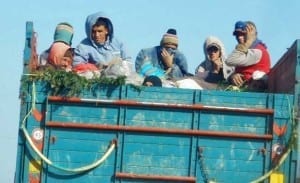
Agriculture workers in Meknes, Morocco, head to work. Credit: Solidarity Center/Hind Cherrouk
The women help determine the issues important to them and also design their trainings, which are conducted through role play because many are illiterate. “The fact that they participate in the design of the role play which builds on their own experiences” is especially meaningful and effective, says Lahrech. Engendering conversation and listening instills participants with the value they deserve, she says.
Lahrech describes how women who initially sat in the back of the room too fearful to speak, have gone on after the trainings to take the microphone at massive rallies on Women’s Day and in CDT meetings where they articulated their rights.
The contract, reached with agro-industry employer, Les Domaines Brahim Zniber, includes first-ever maternity leave, a key demand of the women workers. The contract also is especially important for women because they now have equality with men, says Lahrech. Equality with men means women, who previously were blocked from “male” jobs, like truck driving, now have access to these generally higher paying jobs. “When women can drive trucks, they earn more pay and that is better for everyone,” she says.
Further, the agreement provides employment security for all workers, who had been classified as seasonal and so not eligible for social protections like pensions and health care. The precariousness of agricultural work is compounded by informal employment arrangements driven by the seasons when cash crops are planted and harvested.
Unions Key to Social and Economic Improvements
Lahrech, who also serves as a member of the ITUC’s Women’s Committee and the Arab Trade Union Confederation Women’s Committee, is a long-time union advocate who began working with agricultural workers after she discovered how women in the sector are “at the mercy of the employer, with no social security, no retirement, and in general, not many rights due to the lack of contract.”
Sparked by her participation in student protests, Lahrech made it her life’s goal to effect positive societal change—and soon realized the most effective means to do so is through unions.
“We can’t make the social and economic system change without union involvement,” she says. “When I saw the divide in social classes, I revolted, but I found the frame to challenge this anger—through trade unions.
“Together with others in the union, we share, through solidarity, because things can change with solidarity.”

Apr 17, 2017
Workers who migrate to other countries for jobs often do not know their rights when they arrive, and many, like domestic workers, toil in isolation, where they are easily exploited by employers.
Rosalie Ewengue, a domestic worker in Morocco from the Democratic Republic of Congo, was among them. But after taking part in an awareness-raising campaign with Afrique Culture Maroc, she learned about her rights in the country and on the job, including how to apply for legal status—and now helps other domestic workers do the same.
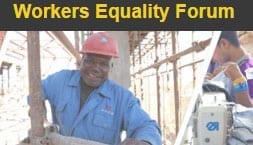 Working with the Collectif des Travailleurs Migrants au Maroc (Morocco Migrant Workers Organization), in partnership with the Solidarity Center, Rosalie is reaching out to migrant domestic workers across Morocco.
Working with the Collectif des Travailleurs Migrants au Maroc (Morocco Migrant Workers Organization), in partnership with the Solidarity Center, Rosalie is reaching out to migrant domestic workers across Morocco.
Rosalie’s story is the latest personal narrative on the Solidarity Center Workers Equality Forum. The online, interactive Equality Forum connects working people and amplifies their voices by enabling them to share their stories, joys, struggles and strategies to better their lives and livelihoods.
Find out more about Rosalie’s story here and meet other workers from around the world, including Lwin Lwin Mar, a Burmese garment worker, and Sam Oliver, a union shop steward working on a Liberian rubber plantation.

Apr 14, 2017
Hi, I am Rosalie Ewengue, I am Congolese. I have worked as a domestic worker in Morocco for eight years, and have been an undocumented migrant worker for six years. I participated in an awareness-raising campaign with the Afrique Culture Maroc and Solidarity Center that focused on the issues facing undocumented migrant workers, and I tried to encourage undocumented women migrant workers to approach the regularization office and register themselves. That’s how I became an activist and a member of Collectif des Travailleurs Migrants au Maroc (Morocco Migrant Workers Organization).
In 2015, and always with Solidarity Center’s partnership, we launched an awareness-raising campaign focused on domestic workers. The goal was to identify the domestic workers and to learn more about their status and working conditions.
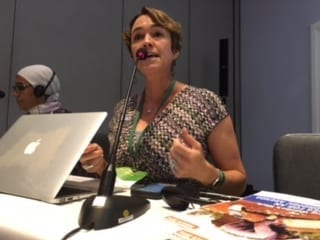
Sep 10, 2016
Globally, women are paid 30 percent less than men—but “imagine instead of corporations making 30 percent more off women’s labor, imagine if that 30 percent were coming back to our communities in the form of wages,” says Shawna Bader-Blau, Solidarity Center executive director.
Speaking on the panel, “Women’s Economic Empowerment and Workers Rights,” a Solidarity Center-sponsored session at the 2016 Association of Women’s Rights in Development (AWID) Forum, Bader-Blau said challenging such wide-reaching corporate power means “we need to partner across social movements.”
Cross-movement building is a goal and theme of the September 8–11 AWID Forum, where more than 1,800 participants from 120 countries are gathering to find strategies for mobilizing greater solidarity and collective power across diverse movements.
Union and worker association leaders from Brazil, Morocco and the United States taking part in the panel shared how unions are helping empower women to achieve economic justice.
Seventy million women around the world are in labor unions or worker associations, says Bader- Blau. “The labor movement is by definition the broadest movement for women on earth that is membership based.”
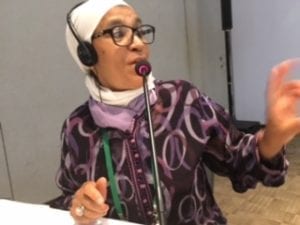
“In the frontlines of this battle we have women who are fighting for labor rights”—Saida Bentahar, CDT Morocco.
In Morocco, the Democratic Confederation of Labor (CDT) in Morocco is helping agricultural workers win bargaining rights with their employers. Most of the workers are women, who live in difficult, fragile conditions, says Saida Bentahar, a member of the CDT Secretariat.
“They sometimes cannot read or write, they live in extreme poverty, they are not paid good wages,” she said, speaking through a translator.
Together with the Solidarity Center, the CDT is training women on their workplace rights, including standing up against sexual harassment.
“Some women wouldn’t even speak at first when we would hold sessions but now they really stand up for what they believe,” says Bentahar. “Together they have written a declaration to guarantee stable labor rights. They will now have equal pay, certificates to assure their skills and capacities. They will have equal opportunities for work and training as well.”
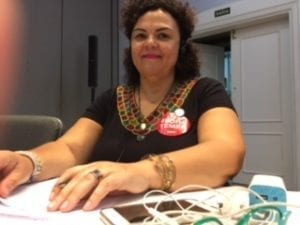
Junéia Batista, CUT national secretary in Brazil, describes union women’s efforts to negotiate day care and other key issues in bargaining with employers. Credit: Solidarity Center/Tula Connell
Junéia Batista, national secretary of the Confederation of Workers Union (CUT) in Brazil, described how women in the confederation have worked to be part of contract negotiations to ensure issues like day care are included, and to achieve leadership since the confederation formed in 1983.
“We want more,” says Batista, speaking through a translator. “It has been 33 years with men, men, men presiding in the presidency,” she says, and women members are working to establish gender equality measures throughout their union structures.
In Mississippi, a state in the southern United States, the Mississippi Worker’s Center for Human Rights (MWCHR) is helping empower working people in Oxford, an impoverished area with a history of racial violence.
“Wages are not the only point of resistance and struggle we need to be dealing with,” says Jaribu Hill, MWCHR executive director.
Panelists also discussed the increasing attacks throughout the world on workers’ ability to form unions.
“Our broader labor movement is suffering from a closing of democratic space,” says Bader-Blau, citing a 30 percent rise in attacks on worker rights around the world. “Our governments, aided by corporate power, are defining worker rights in narrower and narrower terms.”
“In this environment, in this context, we feel it is so important that women’s work be respected and valued … and dignified and that we fight for this,” she says. “The primarily vehicle for fighting for women’s rights at work is trade unionism.”
As Bentahar says, “In the frontlines of this battle we have women who are fighting for labor rights.”
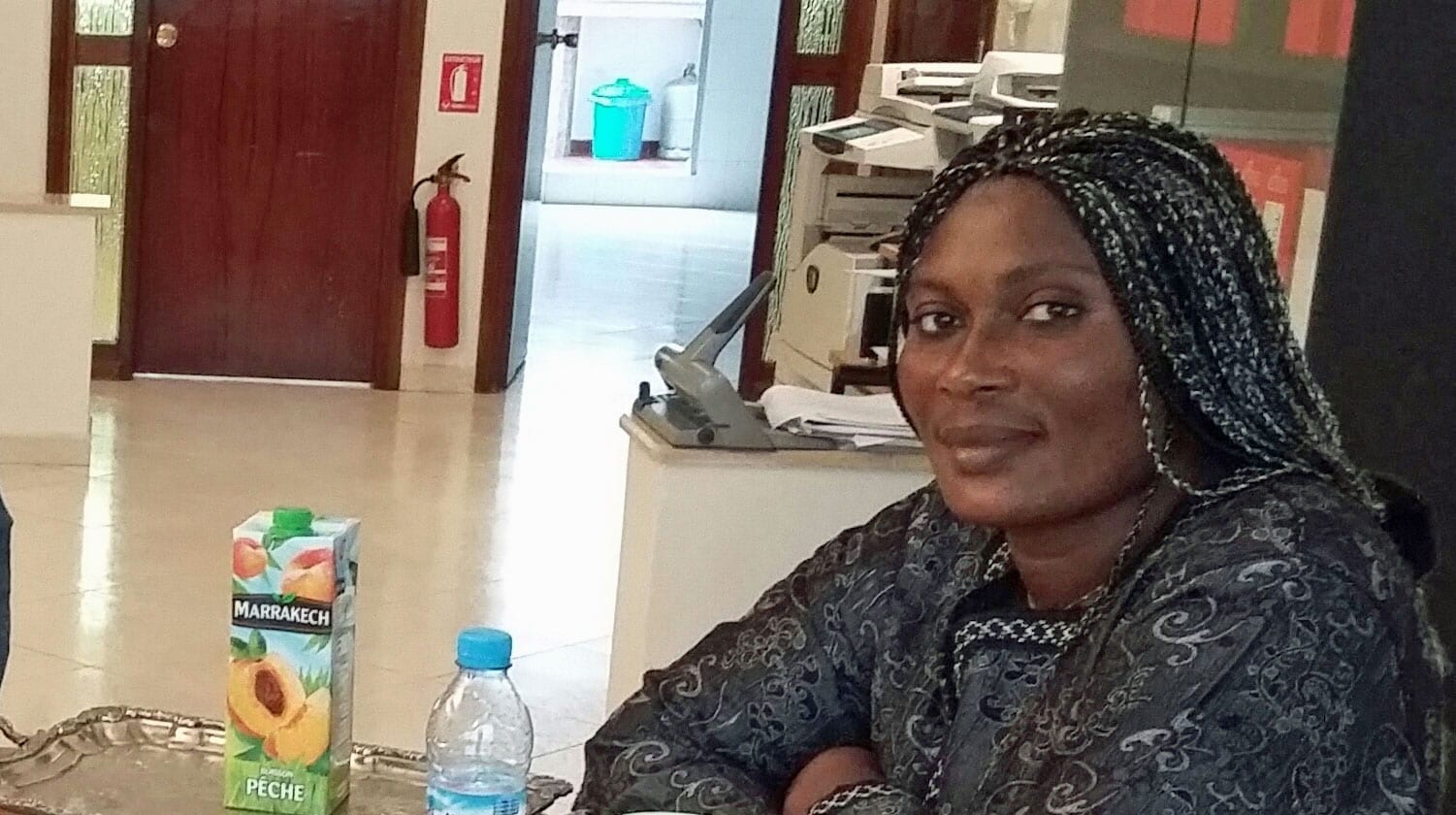
Jun 16, 2016
Some 70 countries around the world have taken action to advance decent work for domestic workers in the five years since the International Labor Organization (ILO) adopted Convention 189, the standard covering domestic worker rights.
The ILO passed Convention 189 on June 16, 2011, after a global coalition of domestic workers, led by the International Domestic Workers Federation (IDWF), mobilized tens of thousands of workers in a campaign for recognition of the workplace rights of domestic workers. Following passage of the standard, workers mark June 16 as International Domestic Workers Day.
Most recently, Morocco passed a law covering gaps in coverage for domestic workers. The bill, approved May 31 by the country’s House of Representatives, sets the minimum age for domestic work at 18 years and raises salaries to 60 percent of the minimum wage provided in other employment sectors. The bill allows for a five-year transitional period in which those between ages 16 years and 18 years can perform domestic work, providing they have written and signed permission from their legal guardians.
Both the Democratic Labor Confederation (CDT) and the Moroccan Labor Union (UMT) praised the law for ending child labor, which they called a form of slavery.
‘I Work from 6 a.m. to 11:30 p.m. Six Days a Week’
Some 53 million workers labor in households around the world, often in isolation and at risk of exploitation and abuse. Guire, an Ivory Coast migrant domestic worker in Rabat, Morocco, is among them. Guire, a mother of four children who has worked two years for her employer, toils long hours for low pay and says her employer treats her poorly. (We are using first names only to protect the workers.)

“I work from 6 a.m. to 11:30 p.m., six days week,” says Guire, a domestic worker in Morocco. Credit: Solidarity Center/Imane Zaghloul
“I work from 6 a.m. to 11:30 p.m., six days week,” says Guire, 41, in an interview with Solidarity Center staff in Morocco. “The work is really hard and I sleep in the living room on a sofa.” Guire says when she became sick, her employer did not provide her with medicine and she has no way to protest her treatment.
Amma, 32, a domestic worker from the Ivory Coast who also traveled to Morocco for domestic work, says employer requires her to “do everything.”
“I do housework, cooking, gardening, take care of the children,” says Amma. She says she is forced to sleep in the garage, is given little to eat and is regularly disparaged. “I receive insults like, ‘You are an animal,’” she says.
Since 2011, 22 countries have ratified the convention on domestic workers, although Morocco is not one of them. Neither Guire nor Amma were aware of the new legislation covering domestic workers, but as Amma says: “I demand respect because we are human beings, and if we come here it is to work, not beg.”











